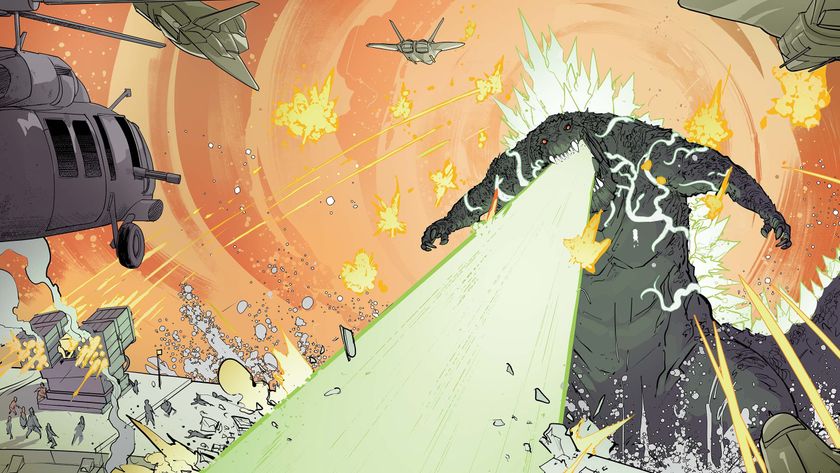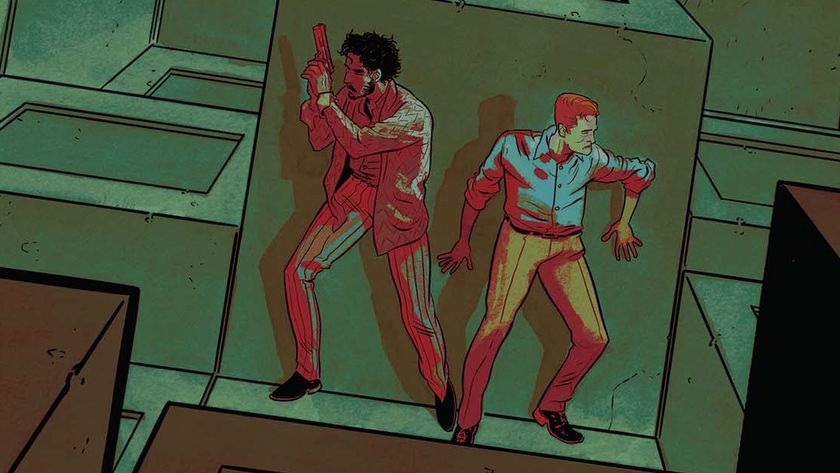Stephen Graham Jones explains why Earthdivers sends a Native American time traveler to kill Christopher Columbus
IDW original series Earthdivers straddles the past and future as its protagonist tries to stop America from happening
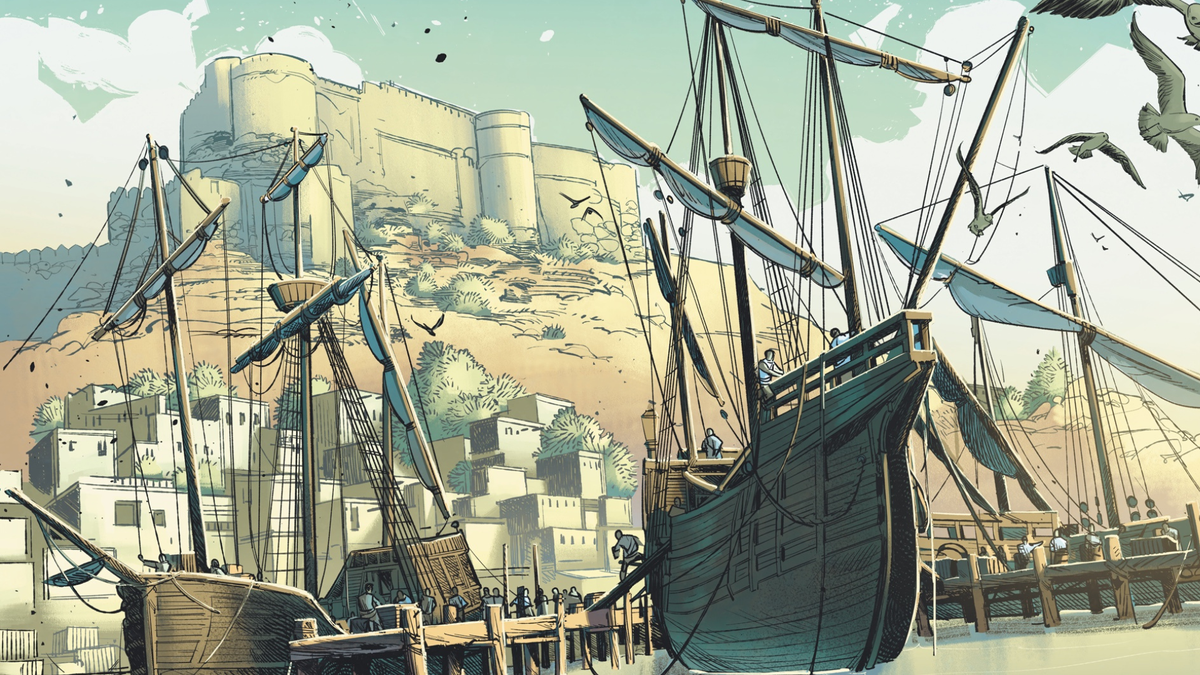
Most time travel stories follow one rule: If you change the past, it will alter the future – often in ways you don't actually want to happen. On the flip side, these stories often ask: If we want to repair the future, are we obligated to return to the past?
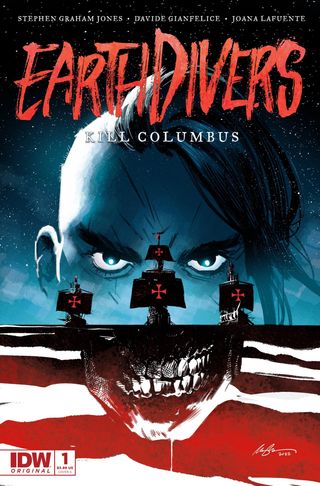
In the case of Earthdivers, a new ongoing series from IDW Publishing that debuts in October, writer Stephen Graham Jones, artist Davide Gianfelice, colorist Joana Lafuente, and letterer Steve Wands send their Native American protagonist, Tad, into the past to kill Christopher Columbus and stop the United States of America from ever happening.
Earthdivers begins in the year 2112 and sends Tad of the Lakota people back to 1492 armed with multiple languages, a detailed itinerary for Columbus's voyage, and a determination to save the world.
He leaves behind his wife, Sosh of the Iñupiat people, and their two companions – Emily of the Seminole tribe and Yellow Kidney, who like Jones is Blackfeet. These three characters have to figure out whether or not Tad succeeds by looking for changes to the world 600 years later.
It's a risky plan with potentially world/reality-changing ramifications, and writer Jones seems to have the whole story mapped out already.
Ahead of the Earthdivers #1 release in October, Newsarama spoke with Jones about his first ever ongoing comics series, including how Neil Gaiman's Sandman inspires his work and why he's gunning for Christopher Columbus.
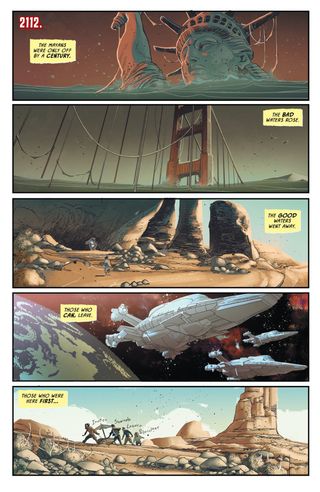
Samantha Puc for Newsarama: Stephen, what drew you to want to write a monthly comic series?
Comic deals, prizes and latest news
Get the best comic news, insights, opinions, analysis and more!
Stephen Graham Jones: A big part of it was that I knew Neil Gaiman did Sandman monthly, and it's one of the most magical pieces of art we have. Having never done a monthly, I thought, 'Well maybe that's the secret.' Just to push yourself to maintain a story in that fashion, where you lead up to a conflict with each issue, and then the reader has to wait a couple weeks and the next installment increases the intensity and the tension even more. I like that idea.
Also, I want to be on that 'new' shelf at the comic book store. That's one of my big dreams.
Nrama: How are you balancing the short-term payoff of each issue with the long-term payoff of the overall story?
Jones: It's a matter of dramatic lines versus the overarching narrative. In each episode or each issue, you want to try and address or look into the dramatic arc – address little problems that then get to some frenzy of complication at the end or possibly fall apart in some fashion, which supports the dramatic line for every issue while also opening up the narrative.
The big narrative [in Earthdivers] is that we've got to go back and change the past so our present will be better and the future will actually happen. It's just about balancing the drama and the narrative for me.
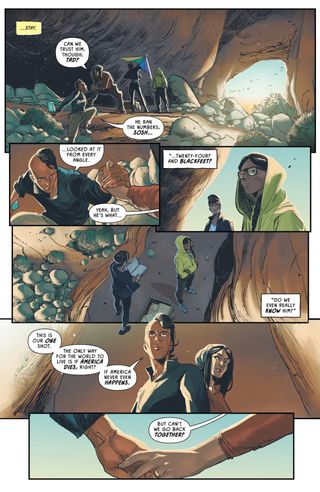
Nrama: What inspired the story in Earthdivers?
Jones: To tell you the truth, in Indian country, you see t-shirts and bumper stickers and stuff that say 'My heroes have always killed cowboys' and 'Columbus didn't discover America.' You know? I feel like I just kind of pushed those two bumper stickers together.
To tell you the truth, in fourth-grade history class, the teacher tried to summarize Christopher Columbus and I was sitting in the back of the classroom thinking, 'He's really a hero? He came over here and opened the floodgates for warfare, for plague, for infection, for so much bad stuff that came with the imperialistic effort to rule America.
I think little fourth-grade me grew up and now I can try and undo the history lessons.
Nrama: How collaborative has the creative process been?
Jones: Oh, it's been wonderful, especially working with the editors. I submit my script and they give me all kinds of notes on it and then Davide gives us the pencils and sketches out the layouts, so the story changes at that point too. Davide will think of a cooler way to do it than I even thought was possible, so everything changes, and it's so magical.
Then Davide does the inks and Joana comes in and pours color into [the pages] and it's like a Disney cartoon, where a character finds a little magic jewel and colors the world, you know? And it's amazing. Then Steve comes in with the letters and somehow makes them expressive. Lettering can contain so much story itself.
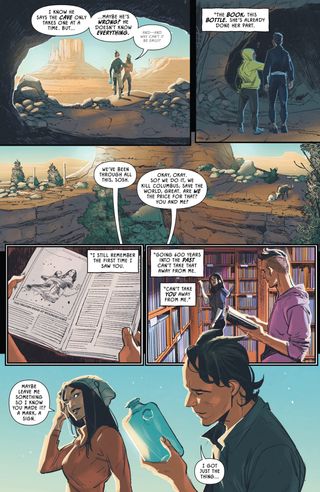
Nrama: How has the story changed?
Jones: My initial pitch for this had a different title. It was 'Columbus and the Age of Discovery.' As we worked through how this would work as a series, I realized 'The Age of Discovery' didn't really answer the thematic elements or address them or provide a limb for them, anyways. So I needed another title. We went back and forth for a while and then finally, after I pitched the story to her, my wife said, 'Well, it sounds like an origin story.'
I had never thought of it like that, but it is. If you're going back to seed a different future, then you are going back to reshape the origin story of everything. She asked, 'What are some big origin stories? What different tribes have different origin stories?'
The first one that popped into my mind – because I had been to a talk about this about three years ago – was the Earthdivers story: Us sending down a succession of animals to find the soil and the Earth we need to make North America and South America and the world. I brought that to my editors and it completely works, I think.
Nrama: What are some of the prominent themes you're exploring in Earthdivers?
Jones: I think every time travel story is a fantasy story, but I would describe this as a justice fantasy story, actually. In this case, it's revenge. It's American Indians going back and trying to cut Christopher Columbus's throat. What could feel better than that, you know?
Really, the fantasy that time travel seems to be engaging is – wouldn't it be nice to go back in time and do that again? We all have regrets in our lives. I wish I had tipped somebody in a hotel room $20 instead of $10 because they actually did a wonderful job and I should have shown that. I wish I could go back and do that.
But the problem, I think, is if we as humans ever get the technology or magical ability to go back and fix things, then I think all we'll do is break everything. The first thing we break is ourselves.
What we are is like a big bundle of regret and desire. Take away that regret, and I think desire takes over and we become different things. That's what I'm really interested in with time travel: the desire to make things better and how inherently mistaken that effort is.
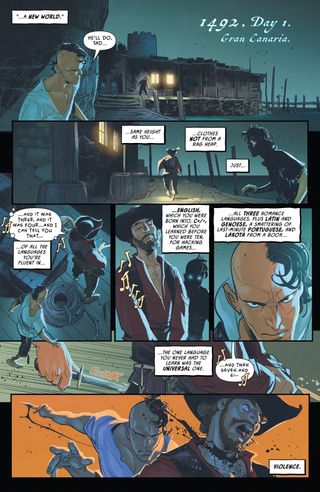
Nrama: Can you speak to the character journey Tad takes?
Jones: For Tad, who's the one who goes back [in time], it's less about 'How does silverware work here?' or the moment-to-moment historical difficulties, and more about the bigger, ethical issues of the whole effort he's partaking in.
You know, everybody talks about how they would go back and kill Hitler, but if you go back to Hitler's crib and you stab a baby and walk away thinking, 'Yeah, I fixed history,' [the question is] at what cost? Is history worth fixing if you have to become a baby killer to do that?
And that's what Tad's wrangling with. As an American Indian, he thinks he's doing right and this is heroic and righteous. He thinks, 'I should be doing this. This is obviously the correct thing to do.' But that's at the macro level. At the micro level, it's sticking your knife into someone. How is your future more important than that person's present?
I think if you're a person with awareness at all then you have to think of those things. You can't just turn off that part of your brain and only look at the good. You have to pump yourself up and realize all the different implications of what you're doing.
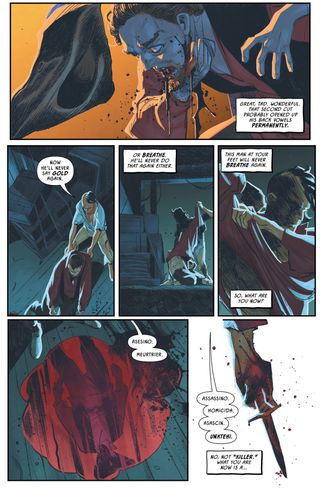
Nrama: Earthdivers takes place in the future and the past; how are you balancing those two storylines and what's required for the planning of the storytelling?
Jones: That was one of the initial concerns for this book: how to juggle those two things. Most time travel stories will go there and stay there. What I landed on almost immediately is that in 1492, I gave myself the rule that you can write across 30 or 40 days in the book's first arc and in these first few issues.
But anything done in the past makes the future be different, which is the present for the people who are in 2112. And they're on a much shorter time field. We won't see 20 or 30 days in the future. We'll see a much more compressed timeline, because if they go too far out into the world, then any changes Tad has wrought will be apparent. That's they're stranded in the desert because it's not going to be notably changed with whatever Tad does.
I definitely have those huge concerns. As the series opens and opens, I think I'll get even bigger concerns.
Nrama: I'm interested to see how Tad's relationships with the people he left behind will change...
Jones: I think even though Tad hasn't been born yet – or even though he's been dead for 600-plus years – that doesn't do anything to diminish Sosh and Tad's feelings for each other. I feel like love persists in spite of all these chronological difficulties.
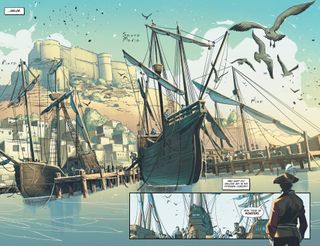
Nrama: Why do you feel like this is the right moment for Earthdivers to be hitting shelves?
Jones: I feel like the last four or five years in America have been kind of turbid from people who have been pushed aside trying to find their way back to the center or even just back inside. There are a lot of different things kicking open the door, I think, but the result is there are so many diverse voices now finding their way to the microphone. Earthdivers happening right now feels less right and more inevitable if that makes sense.
We're at a time right now where so much of the American population is questioning what America is. I think 50 or 60 years ago, the sentiment in America was much more invested or patriotic, but now a lot of Americans are embarrassed of our global profile. When we go places, we don't necessarily say we're from America because we know our reputation precedes us.
And I think we're starting to realize that America is and has been an experiment, and it's one that's starting to crumble or fall apart. So hopefully a book like this – which comes at the very core, seed, beginning, origin, whatever – of American identity can contribute critically to that effort. Not necessarily to pull America down, but to make people more aware of the footprint we leave and how it's got blood in it.

Nrama: What do you want to accomplish with Earthdivers? What do you want readers to take away?
Jones: With any piece of work, the very first thing you want for your readership is for them to be entertained. I want them to invest in and engage with these characters and root for them and root against this decision or that decision.
I want them to also want to take Columbus down. I think if I can somehow bring the readership over to my side, where we all want to cut Christopher Columbus's throat and stop America from happening, then it makes the world a better place. To me it does, anyway. We can all have the same bumper stickers maybe.
Earthdivers #1 will be available October 5.
Earthdivers combines several genres, including horror - and these are the best horror comics of all time.

Samantha Puc (she/they) is an editor at Newsarama and an avid comics fan. Their writing has been featured on Refinery29, Bitch Media, them., The Beat, The Mary Sue, and elsewhere. She is currently pursuing a Master of Fine Arts degree in creative nonfiction at The New School.
